USDA seeks projects for feral swine eradication
Farm bill program offers $75 million to help manage feral swine and eliminate populations.
June 20, 2019

The U.S. Department of Agriculture announced that it is offering $75 million in funding for the eradication and control of feral swine through the Feral Swine Eradication & Control Pilot Program (FSCP) as a joint effort between USDA’s Natural Resources Conservation Service (NRCS) and Animal & Plant Health Inspection Service (APHIS). The 2018 farm bill included this new pilot program to help address the threat feral swine pose to agriculture, ecosystems and human and animal health.
NRCS will direct up to $33.75 million of the allocated FSCP funds toward partnership efforts to work with landowners on identified pilot projects in targeted areas. Applications are being accepted through Aug. 19, 2019, for partners to carry out activities as part of these pilot projects in selected areas of Alabama, Arkansas, Florida, Georgia, Louisiana, Mississippi, North Carolina, Oklahoma, South Carolina and Texas. APHIS has determined that these states have among the highest feral swine population densities and associated damages in the country.
“NRCS state conservationists and APHIS state directors, in coordination with state technical committees, have identified pilot projects that can be carried out within these target states,” NRCS chief Matthew Lohr said. “Our agencies stand ready to work with partners at the state and local level to respond to the threat of feral swine.”
Pilot projects will consist broadly of three coordinated components: (1) feral swine removal by APHIS, (2) restoration efforts supported by NRCS and (3) assistance to producers for feral swine control provided through partnership agreements with non-federal partners. Projects can be one to three years in duration.
“The projects selected for funding will allow APHIS and NRCS to collectively reduce the damage and disease caused by one of the most destructive and formidable invasive species in the United States,” APHIS administrator Kevin Shea said. “Overall, this pilot program builds upon and expands work already underway by APHIS’s National Feral Swine Damage Management Program to both manage feral swine and eliminate populations, in partnership with local government, the private sector, industry and academia.”
National Pork Producers Council (NPPC) president David Herring, a pork producer from Lillington, N.C., welcomed the proposal.
"We thank USDA for implementing this important farm bill program to reduce feral swine populations. Wild pigs are difficult to control, and when in close proximity to domestic production, they are almost impossible to control. Most seriously, we are concerned about the spread of feral swine carrying diseases, including African swine fever (ASF), an animal disease affecting only pigs and with no human health or food safety risks. While outbreaks of ASF continue throughout China and other parts of Asia, there are no reported cases in the United States. With no vaccination available, prevention is our only defense, and that's why this program is so vitally important," Herring said.
This pilot program was one of NPPC's main priorities in the 2018 farm bill. According to USDA, there are an estimated 5 million feral swine in at least 39 states; the cost of controlling them and the amount of damage they do totals about $1.5 billion annually.
NRCS is now accepting proposals from non-federal partners to provide landowner assistance for on-farm trapping and related services as part of the pilot projects described above. NRCS will provide funding for these services through partnership agreements. The funding limit for a single award is $1.5 million. Awardees will be required to provide at least 25% of the partnership agreement budget as a match to NRCS funding.
Additional information on the complete funding announcement and about specific pilot projects, including target areas and the roles for which partner assistance is being requested, can be found on the FSCP webpage.
You May Also Like



